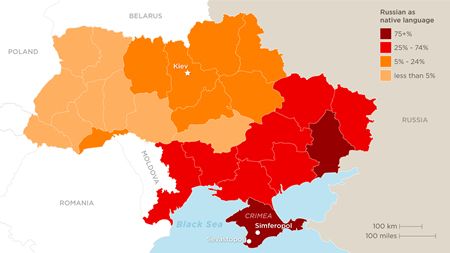If
you know me, or if you’ve followed this blog for a while, you might have
already guessed that I would be following the events in Ukraine closely. I
haven’t blogged about it any, as I am not an expert on Ukraine, and as there are many experts and folks on the ground sharing their views and stories. (However, as
there are many talking heads out there presenting themselves as ‘experts’ who
in fact have no clue, I’d probably fit right in, and maybe even do a better job; sigh.) However, I ran across
something last night that I really wanted to share. That ‘something’ was an
article, published in 2004 in volume 27 of the Ethnic and Racial Studies
journal, written by Greta Uehling, and entitled The first independent Ukrainian census in Crimea: Myths, miscoding, and
missed opportunities. It discusses the 2001 Ukrainian census, with a focus
on the Crimean peninsula. It’s not the most recent of articles, but it provided
some really interesting insight to the current situation in Crimea.
Over
the past few weeks, I have seen an inordinate amount of maps, such as this one
from CNN:

From what I read, however, it seems that the facts pertaining to nationality and language in Crimea might not be as clear-cut as presented in the mainstream media. Now,
granted, the article I'm referring to is on the 2001 census, not on the more recent
2011 census; however, if any of the flaws present in the 2001 census remained
in 2011, then the lines on the map might not be anywhere near as distinct as
the ‘experts’ on the various news shows would like us to believe. As I
mentioned, the article in question focused on the Crimea. Based on the
observations and interviews conducted by Uehling, it seems that there were a
lot of biases among the census-takers themselves, and these biases directly
affected the manner in which facts pertaining to native language and
nationality were reported.
The
article stated that that when individuals were asked what their native language
was, "if a
person responded 'Russian' or 'Crimean Tatar' it was simply written as stated.
If, on the other hand, the answer was Ukrainian language, the census takers
were instructed to ask for clarification. This created a certain pressure for
respondents in Crimea to scale back their level of Ukrainian” (p. 158).
In
addition to asking about individuals’ native language, census-takers were
instructed to ascertain each individual’s nationality. “[O]ne census-taker
automatically identified several respondents as Russian, based on the fact that
they said Russian was their native language…. [because] it had been ‘apparent’
to her that they were Russian” (p. 156). During my (albeit short) time in
Ukraine, I met many ‘ethnically Ukrainian’ people who spoke Russian as their
first language, which makes this kind of assumption seem rather absurd.
Additionally, people were allowed to report on other individuals, such as
fellow dorm residents and flatmates, whose actual first language and
nationality might not have been known to them.
Another
problem was that mixed nationalities were not an option - so if someone had,
say, a Ukrainian mother and a Russian father, there was no accurate option to
explain their nationality. In Crimea, apparently, the census-takers tended to
write 'Russian' for nationality in such circumstances, whereas in western
Ukraine census-takers tended to write Ukrainian in such circumstances. One
example included in the article stated, “[W]hen a woman did not know what to
say about her son’s nationality, the census-taker suggested that, ‘Since
nationality is determined by the father in Russia and by the mother in Ukraine,
we will write down Russian.” Such ‘logic’ is rather mind-boggling.
Like
I said, this article is based on the 2001 census, not the most recent one.
However, it should give you something to keep in mind when you see all those
maps of a ‘divided’ Ukraine.
![international [cat] lady of mystery](https://blogger.googleusercontent.com/img/b/R29vZ2xl/AVvXsEgnPJiUgfmMHEUcIPKDuSiTQFpnXgSofemne4WBX0VfEv-Bym8HdPHiD-iC2mNCJQog2tvPXKao_9vpRJG_vl4Yfi0ZTX_p3YpHLCie0rUHAJLgwcAb-Otj7hzc-_UkSI-yRNlpG45z8Wo/s1600/newblogtop2014b.jpg)
No comments:
Post a Comment